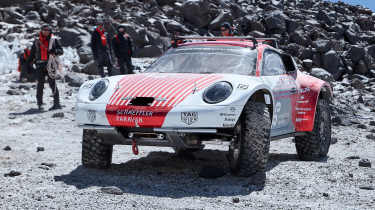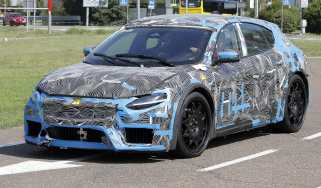Dakar-inspired Porsche 911 climbs world’s highest volcano
36 years since the 959 Dakar made its debut, Porsche has given the 992 911 a similar makeover
The Porsche 911 has seen plenty of success on both road and track, but now its maker is keen to see how the model performs on less conventional terrain. Said to have been developed purely as experimental prototypes, two 992-generation 911s have been modified for the project, which has successfully completed its first challenge.
Over three decades since the Dakar 959 traversed Africa's toughest terrain, Porsche has applied a similar formula to the 992 Carrera 4S, the prototypes featuring a comprehensive upgrade package to help them withstand less-than-ideal driving conditions.
> Porsche 911 Safari mule spied – latest sighting reveals new rear wing
To put them to the test, Porsche took the pair of prototypes to Ojos del Salado in Chile, the world’s highest volcano with a peak altitude of 22,614ft (6892m). With ice fields, a 50 per cent reduction in available oxygen and temperatures in the region of -30 degrees Celsius, it wasn’t an easy first task. Nevertheless, with Le Mans winner Romain Dumas at the wheel, one of the cars reached an impressive peak altitude of 19,708ft (6007m).
Dumas said: ‘No one has seen so much ice and snow up towards the top of the volcano, but despite this we went over 6000 metres up, to the point where the walls of ice and snow meant we could go no further. We’re really proud of what the car and the team are capable of first time out.’
Though based on the ordinary road-going 992 Carrera 4S, portal axles, large off-road tyres, differential locks and Aramid fibre underbody protection all contribute to an improvement in off-road performance. A roll-cage, carbonfibre seats and harnesses are also included for safety, with the cooling system shifted upwards to reduce the risk of damage.
Thanks to the portal axles and revised bodywork, each prototype now has ground clearance of 350mm, with a winch and steer-by-wire system also new. Gear ratios have been lowered to allow for better low-speed precision, with the ‘Porsche Warp-Connecter’ mechanically linking all four wheels for constant wheel load, offering maximum traction even under extreme conditions.
These models won’t make it to production, but time will tell if they’re a sign of things to come…








